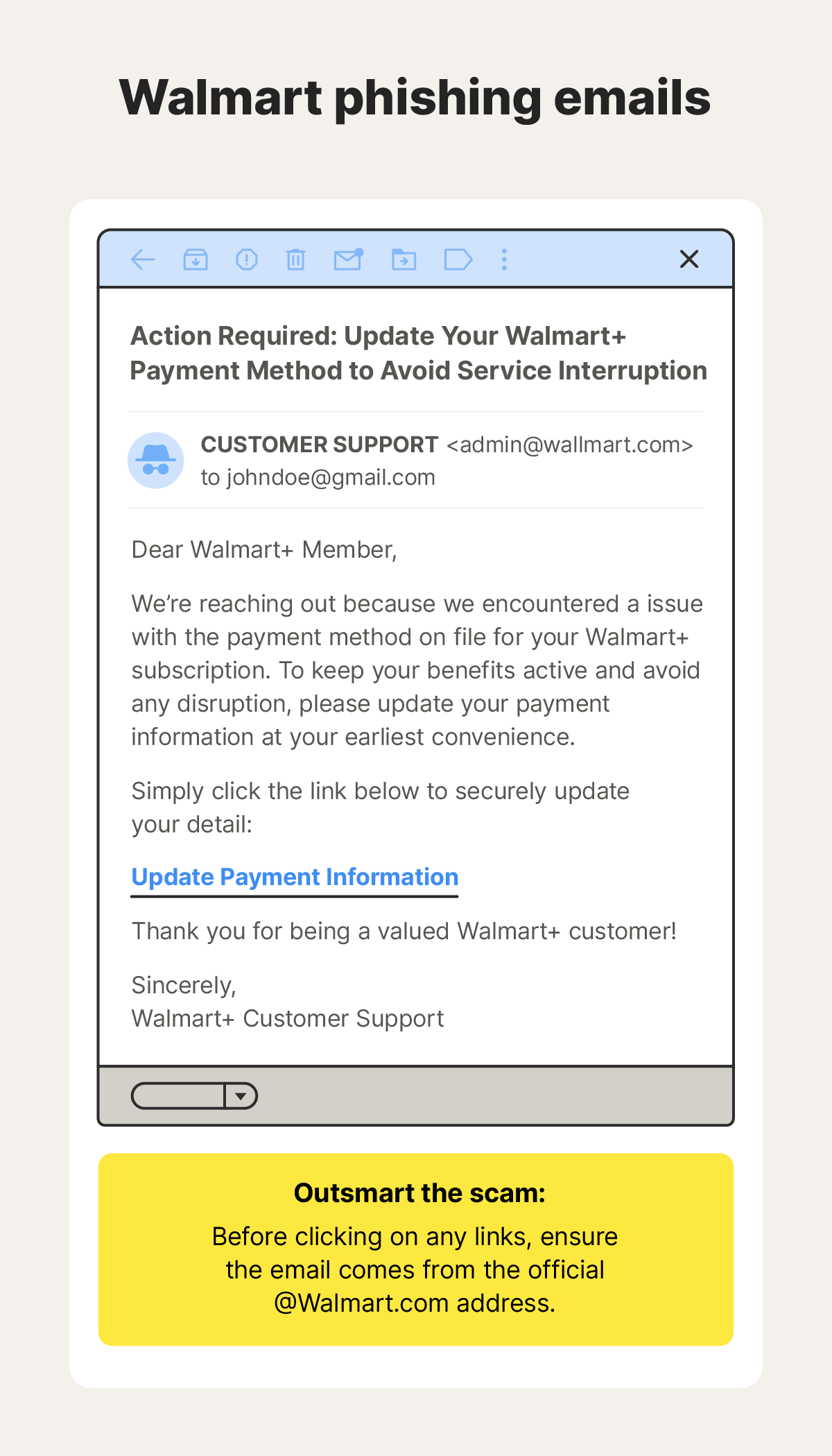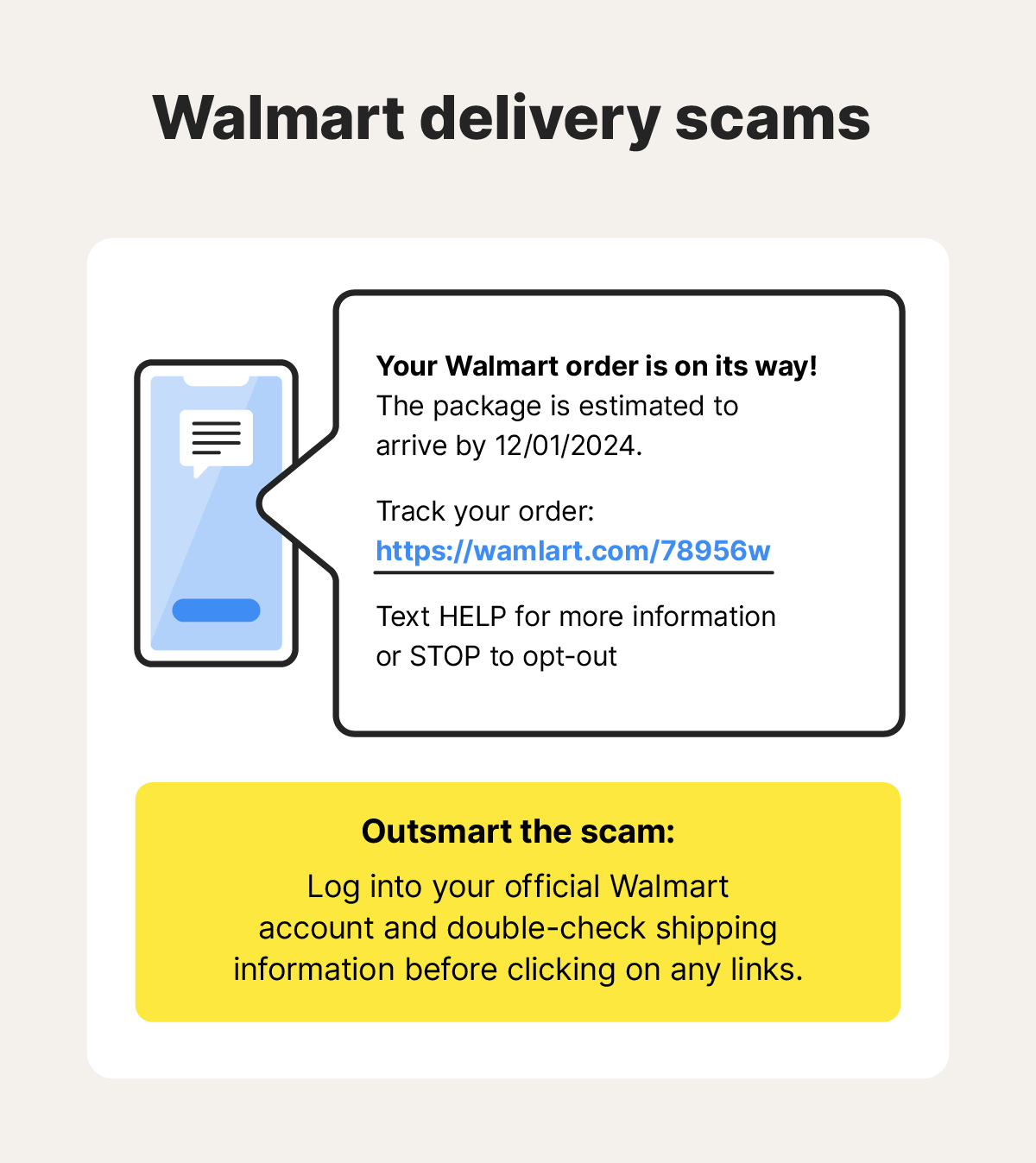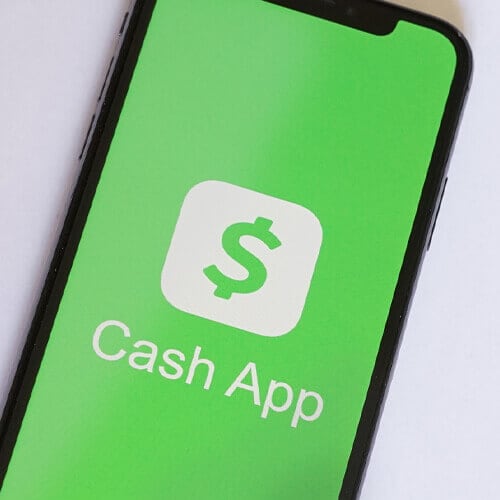Outsmart the gift card scam: Never give Walmart gift card details to strangers — these cards are meant for gifting to people you know, not for payments to unknown individuals or government agencies (that never accept gift cards as payment).
As the world's largest retailer, Walmart’s popularity has naturally attracted the attention of scammers. Between 2013 and 2022, consumers lost more than $1 billion to fraudulent schemes that abuse the trusted Walmart brand. Fraudsters use deceptive methods ranging from fake surveys to complex gift card scams to trick innocent people out of their money and sensitive personal data.
Becoming familiar with common Walmart scams can help you spot and avoid them. Read on to uncover 13 tactics scammers use to target Walmart customers, and learn how you can help protect yourself from fraud today.
1. Walmart gift card scams
In one of the most common Walmart scams, fraudsters use social engineering and scare tactics to convince you to load a Walmart gift card with money and give them the card number and PIN. They may impersonate authority figures like IRS agents and make their requests sound urgent.
In one real-world example, a scammer impersonated an FBI agent and warned a woman that drug traffickers were using her Social Security number to launder money. The scammer convinced her to purchase $2,000 in Walmart gift cards and send them pictures of the serial numbers and PIN in order to “assist in the investigation.” Accomplices then used this data to purchase other retailers’ gift cards. This made the funds untraceable and left the victim unable to get her money back.
While Walmart leverages video surveillance and other methods to combat fraud, which has helped it successfully freeze more than $4 million in illicitly obtained gift cards, many victims never recover the funds they lose.
2. Fake Walmart gift card “balance checker” tools
Another way scammers try to steal Walmart gift cards is by creating fake online gift card balance checkers. These tools may seem convenient, as it can be hard to remember how much money is on your gift cards, but using them could make your gift cards worthless.
Scammers design balance checker sites to look legitimate, with Walmart’s colors and branding. However, once you type in your gift card information, the scammer steals your card details and drains your balance.
Outsmart the balance checker scam: Only check gift card balances using Walmart’s official gift card balance tool.
3. Walmart scams on Facebook Marketplace
Be aware of Facebook Marketplace scams involving Walmart. Some scammers may attempt to sell Walmart gift cards at a discounted rate, but these gift cards are fake or have no balance.
Likewise, never trust sellers who request payment in Walmart gift cards. Remember that gift card transactions are typically irreversible and untraceable, meaning that if you fall for the scam, you may not be able to recover the funds you lose. You might also encounter similar eBay or Craigslist scams using these tactics.
Outsmart the Walmart Facebook Marketplace scam: Don’t purchase Walmart gift cards through Facebook Marketplace or any other resale platform. And steer clear of sellers who request payment in the form of gift cards.
4. Walmart self-checkout scams
Although most Walmart scams occur online, some specifically target in-store shoppers. In one notable self-checkout scam, scammers begin to purchase a pre-paid debit card at a self-checkout stand. But instead of completing the transaction, they pocket the card and wait nearby. Their hope is that someone else will begin their own checkout process, failing to notice that a pre-paid card has already been scanned.
Customers in a hurry might not realize they’ve paid for a $50 credit card top-up they never intended to buy unless they check their receipt and notice items labeled “Debit load” or “Visa.”
In another self-checkout scam, spotted in California, organized crime groups were caught stealing victims’ credit card details by installing fake card skimmers on self-checkout kiosks.
Outsmart the self-checkout scam: Before you begin using a self-checkout stand, ensure you’re starting a new transaction. Perform a visual check to make sure nothing about the skimmer looks out of the ordinary.
5. Bogus Walmart sweepstakes and giveaways on social media
Don’t be fooled by scammers promoting Walmart gift card giveaways or other sweepstakes on social media such as Facebook or Snapchat. As social media giveaways have become increasingly popular, scammers have created fake versions with malicious links. These scams will prompt you to provide details like your email, name, address, and credit card number to claim your prize.
If you provide enough information to these cybercriminals, they could steal your money or identity. Remember, if something sounds too good to be true, it probably is.
Outsmart the bogus giveaway scam: Only enter Walmart giveaways through the retailer’s official, verified social media accounts: @walmart on Instagram, @walmart on X (formerly Twitter), and Walmart on Facebook. Always make sure the account is verified before clicking any links.
6. Fake Walmart pop-up ads
As you browse the web, you may encounter pop-up ads claiming you’ve won $1,000 in Walmart gift cards or another prize. These are scams. Clicking them could result in a malware infection or a type of identity theft.
If you see such ads frequently, your device may already be infected with adware, a type of malware that installs on your device and generates unwanted and often dangerous ads.
Outsmart the fake ad scam: Never click online ads offering free gift cards or other prizes. Install anti-virus software to make sure your device is secure.
7. Walmart phishing emails
Scammers can send phishing emails or texts disguised as messages from Walmart. Phishing is a practice where fraudsters mimic a legitimate person or organization to trick people into providing sensitive personal information, like credit card numbers.
Walmart phishing emails are designed to look convincing, using Walmart’s logo, branded colors, and a fake email address that looks very similar to the real one. These dangerous emails may imitate the following:
- Order confirmation messages
- Account verification requests
- Requests to update payment information
- Password reset requests for your Walmart+ account
- Fake giveaway notifications
Be cautious when you receive emails that appear to be from Walmart. Clicking malicious links in fake Walmart emails can compromise your account, and scammers may gain access to other personally identifiable information.
Outsmart the phishing scam: Always verify the sender’s email address before clicking any links and ensure the email is from the official @walmart.com address. If a message uses poor grammar, misspells the brand name, or displays outdated logos, it’s a scam.


8. Walmart scam calls
In Walmart scam calls, fraudsters impersonate Walmart employees over the phone to steal personal information or financial details.
In one recent Walmart phone scam reported to the Better Business Bureau, a fake Walmart representative left a voicemail claiming their would-be victim had ordered an expensive PlayStation console, prompting them to press 1 to speak with customer service and cancel the order.
If you press 1, the impersonator could request access to your device, ask for your credit card details to process the cancellation, or trick you into providing other sensitive information. Giving away such data to fraudsters can result in identity theft and financial loss.
Outsmart the call scam: If you’re unsure about the legitimacy of a phone call, hang up and call Walmart’s official customer service number at (800) 925-6278 — (800-WALMART). Remember, Walmart employees generally won’t call you to confirm orders.
9. Fraudulent Walmart surveys
Walmart offers an in-store experience survey that customers can access through a link on their receipt or via an email from Walmart’s survey team. If you participate in the official survey, you can enter into sweepstakes for prizes.
However, scammers have caught wind of this survey and created fake versions to deceive customers. These Walmart survey scams often come as texts or emails urging recipients to complete a fake questionnaire that leads to malicious links or requests for personal information, allowing fraudsters to steal your identity.
Outsmart the survey scam: If you’re unsure whether a Walmart survey is legitimate, email surveysupport@walmart.com to confirm.
10. Walmart mystery shopper scams
Some businesses use mystery shopping to evaluate the quality of their customers’ experience. Walmart, however, maintains on its website that it does not pay for such services. This hasn’t stopped scammers from creating false job advertisements for Walmart mystery shoppers or secret shoppers.
Such scammers may send emails or post fake job openings luring people in with high salaries for little work. They may even “pay you in advance” with a fraudulent check.
Outsmart the mystery shopper scam: Remember that Walmart will never send emails or post online ads seeking mystery shoppers — this position doesn’t exist.
11. Walmart delivery scams
Given the huge size of Walmart’s operations, many people are likely expecting a delivery from the retailer at any given time. Scammers exploit this probability by sending fake order confirmation texts with fraudulent tracking links designed to look like they’re from Walmart. The message may claim that there’s an issue with the order, prompting recipients to click the link to resolve it.
As with other types of phishing, clicking such links can result in malware infections, identity theft, and other undesirable consequences.
Outsmart the delivery scam: Log into your official Walmart account for shipping and delivery information. If you receive an email or text message, verify that the online order number in the message is correct before clicking any links. Be on the lookout for misspellings and incorrect URLs.


12. Fake “Walmart Foundation” grants
Scammers impersonate the Walmart Foundation, the retailer’s philanthropic arm, to carry out a version of a charity scam. The fraudsters contact people via text or email and ask them to fill out an application with their personal information to apply for a fake grant.
Although the Walmart Foundation is a legitimate program that supports various initiatives, it awards grants only to organizations, not individuals.
Outsmart the Walmart Foundation scam: Note that the Walmart Foundation does not provide grants to individuals and will never contact you about grants via text message or email.
13. Walmart money transfer fraud
In schemes resembling gift card scams, fraudsters exploit Walmart’s convenient money transfer services to trick people into sending money. To fleece their victims, the scammer may impersonate a law enforcement officer or someone in desperate need.
The Federal Trade Commission (FTC) has even sued Walmart for facilitating these scams. According to the lawsuit, Walmart reportedly failed to conduct proper employee training and didn’t provide customers with adequate fraud warnings. While judges have dismissed some of these claims, money transfer scams remain an ongoing problem.
Outsmart the money transfer scam: Never send a money transfer to anyone you don’t know and trust.
Can I get my money back if I fall for a Walmart scam?
It may be possible to get your money back, depending on the scam you fell for and the payment method you used. You are more likely to recover your lost funds if you paid by card than if you sent the fraudster money via wire transfer or cryptocurrency, making you vulnerable to wire transfer fraud or crypto scams.
If you file a chargeback, your credit card company or bank may be able to cancel the card transactions or refund the scammed money. Just make sure that you notify them as soon as you realize you’ve been scammed.
If you paid the scammer with a Walmart gift card, the company’s technology might be able to track and freeze the stolen funds if you act quickly. However, Walmart’s gift card terms and conditions explicitly state that the retailer does not replace lost or stolen gift cards.
7 steps to take after falling victim to a Walmart scam
If you’ve already been targeted by a Walmart scam, there are steps you can take to minimize the damage. Here’s what to do if you were scammed:
- Notify your bank immediately if you provided the scammer with financial details such as your credit card or bank account number.
- Change your Walmart+ password to a strong and unique one to prevent unauthorized access, and remove saved payment information from your account to reduce the risk of fraudulent transactions.
- Alert Walmart of the scam by emailing their team at onlineabuse@walmart.com.
- Call Walmart at (888) 537-5503 if the scam involved gift cards to report the issue and inquire about the possibility of tracking and freezing the stolen funds.
- Place a fraud alert or credit freeze on your credit report if you believe your personal information may have been compromised.
- Report the scam to the FTC at https://ReportFraud.ftc.gov/.
- File a police report with local law enforcement.
Help protect against Walmart scams with LifeLock
If you fall for a scam, the last thing you want is to spend the weekend on the phone with the bank, trying to get your money back. A LifeLock membership grants you peace of mind by helping prevent identity theft in the first place. And if you do become a victim of identity theft, LifeLock’s dedicated U.S.-based restoration specialists can help you recover your identity and reimburse* you for stolen funds.
Walmart is a trademark of Walmart Apollo, LLC.
*Reimbursement and Expense Compensation, each with limits of up to $1 million for Total, up to $100,000 for Advanced and up to $25,000 for Core. And up to $1 million for coverage for lawyers and experts if needed, for all plans. Benefits under the Master Policy are issued and covered by United Specialty Insurance Company (State National Insurance Company, Inc. for NY State members). Policy terms, conditions and exclusions at: LifeLock.com/legal.
Editor’s note: Our articles provide educational information. LifeLock offerings may not cover or protect against every type of crime, fraud, or threat we write about.
This article contains
- 1. Walmart gift card scams
- 2. Fake Walmart gift card “balance checker” tools
- 3. Walmart scams on Facebook Marketplace
- 4. Walmart self-checkout scams
- 5. Bogus Walmart sweepstakes and giveaways on social media
- 6. Fake Walmart pop-up ads
- 7. Walmart phishing emails
- 8. Walmart scam calls
- 9. Fraudulent Walmart surveys
- 10. Walmart mystery shopper scams
- 11. Walmart delivery scams
- 12. Fake “Walmart Foundation” grants
- 13. Walmart money transfer fraud
- Can I get my money back if I fall for a Walmart scam?
- 7 steps to take after falling victim to a Walmart scam
- Help protect against Walmart scams with LifeLock
Start your protection,
enroll in minutes.
LifeLock is part of Gen – a global company with a family of trusted brands.
Copyright © 2026 Gen Digital Inc. All rights reserved. Gen trademarks or registered trademarks are property of Gen Digital Inc. or its affiliates. Firefox is a trademark of Mozilla Foundation. Android, Google Chrome, Google Play and the Google Play logo are trademarks of Google, LLC. Mac, iPhone, iPad, Apple and the Apple logo are trademarks of Apple Inc., registered in the U.S. and other countries. App Store is a service mark of Apple Inc. Alexa and all related logos are trademarks of Amazon.com, Inc. or its affiliates. Microsoft and the Window logo are trademarks of Microsoft Corporation in the U.S. and other countries. The Android robot is reproduced or modified from work created and shared by Google and used according to terms described in the Creative Commons 3.0 Attribution License. Other names may be trademarks of their respective owners.








